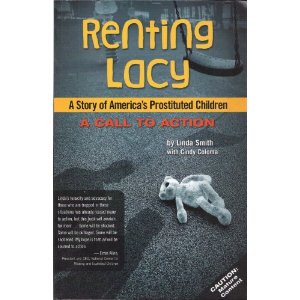by Christie Arnold
 Renting Lacy: A Story of America’s Prostituted Children provides a realistic and heart-wrenching look into the underground world of child sex trafficking in the United States. Author Linda Smith is a former congresswoman and founder of Shared Hope International, which works to eradicate sex trafficking and commercial sexual exploitation.
Renting Lacy: A Story of America’s Prostituted Children provides a realistic and heart-wrenching look into the underground world of child sex trafficking in the United States. Author Linda Smith is a former congresswoman and founder of Shared Hope International, which works to eradicate sex trafficking and commercial sexual exploitation.
Smith has created a thought-provoking and riveting account of the exploitation occurring in cities across the country: hundreds of thousands of American girls and teenagers being prostituted in the commercial sex industry. Renting Lacy tells Lacy’s story as a victim being prostituted by her boyfriend and pimp, Bobby Bad. Although fictionalized, all of the characters and their stories are based on actual events and accounts compiled from reports, cases, transcripts of investigations and victims’ testimonies.
Renting Lacy alternates between narrative about several teenage girls in the child sex slave industry and informative commentary about the reality of child sex slavery in America. Speaking from multiple perspectives, readers learn about the horrifying techniques that pimps and traffickers apply to lure, coerce, and force girls into prostitution. Using both psychological manipulation and physical abuse, pimps target and entrap the most vulnerable of victims. False promises of love and security often lure her in, and violence subdues her to a state of complete dependency and sometimes loyalty.
Girls are forced out their childhood into a dehumanizing existence as “ladies of the night.” The majority of these girls bear a common thread in their yearning for love and a lack of it in their homes. Their desperation and naïveté lead them into the arms of “boyfriends” who stall, only for a moment, continued abuse and mistreatment.
Gripping and raw, this account exposes the unquenchable lust that motivates thousands of “Johns” who pay for sex. These “clients” engage in both daily and nightly abuse that can only be described as shocking. At the other end is law enforcement, which faces both institutional and internalized challenges in their work; the problem recycles itself so long as law enforcement fails to consider the “child prostitutes” as victims and not criminals.
Renting Lacy is a disturbing but necessary account of a hidden and growing crime in our own backyard. These aren’t stories about foreigners thousands of miles away, but about American children–our daughters, neighbors, sisters, classmates and friends. Smith tactfully provides emotional connections to these hurting girls and presents essential information about the widespread exploitation occurring every day, everywhere.
In response to these stories and facts, I could do nothing but think about my little sister. What if this happened to her? What would I do? How would I respond? I sat down and cried for the victims’ lost innocence, pain and mistreatment. My heart broke over the brokenness that has allowed this exploitation to not only exist but flourish.
That the systematic rape, abduction, enslavement, abuse and torture of thousands of girls occurs every moment of every day and night in this country is a horrifying reality. I realized it was something I couldn’t just walk away from and pretend I had never heard.
I began to understand how the pimps recruit and keep their victims enslaved. I read of the appalling abuse and got a glimpse into the child victims’ desperation and pain. I wondered, where is the outrage and shock over the fact that so many men are lusting after and having sex with their neighbors’ children? I realized why this crime continues and escalates; it is solely fueled by a continuing and escalating demand from the clients. The men who buy commercial sex are demanding a certain “product” from the industry, and the traffickers see the gold to be had in supplying it.
This heart-breaking discovery of the American sex trade has been life-changing and worldview-altering. In the face of such daunting injustice, feelings of helplessness were at first overwhelming, but an urge to react in a helpful way was stronger. Renting Lacy concludes with a challenge and hope, in that it encourages and promotes readers to take action on behalf of the exploited girls, our children, daughters, neighbors, sisters, classmates and friends.
I encourage as many people as possible to read this book; it will open your eyes to the exploitation and hopefully your heart and mind as well, so that you can respond with prayer, understanding, resolve, and engagement to help protect our children and end their exploitation.
. . . .
 Christie Arnold is a senior at the University of North Carolina at Chapel Hill. She is majoring in International Studies with a minor in Social and Economic Justice. She is passionate about fighting against sex trafficking and is a summer 2011 intern with pureJUSTICE.
Christie Arnold is a senior at the University of North Carolina at Chapel Hill. She is majoring in International Studies with a minor in Social and Economic Justice. She is passionate about fighting against sex trafficking and is a summer 2011 intern with pureJUSTICE.







0 comments.